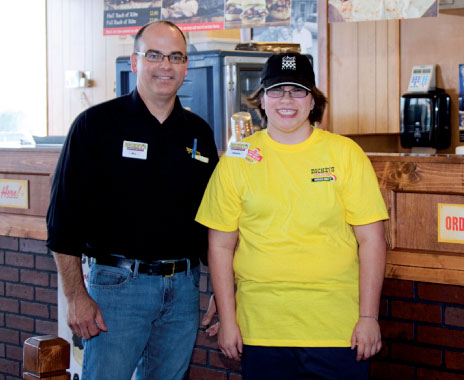Building a reliable workforce is essential to success in the quick-serve business, as is connecting with the local community through socially conscious means.
At least one franchisee is killing those two birds with one stone by integrating his hiring process with his charitable work. A Wisconsin-based Dickey’s Barbecue Pit is employing interns through a nearby program that gives students with intellectual disabilities (ID) hands-on work experience.
For Bill Zimmerman, owner of the Dickey’s location in Kenosha, Wisconsin, it made perfect sense to offer internships to individuals with IDs from a nearby specialty college.
“It was something simple I could do,” he says. “Dickey’s has always been invested in communities and that’s important to me, too. It was a no-brainer.”
Shepherds Ministries, the organization behind the internship program, is located in Union Grove, Wisconsin, and boasts a long history of addressing the needs of individuals with IDs and their families. In 2008, it established Shepherds College, a three-year post-secondary educational program where young adults spend two years learning life and career skills to assist their transitions from school to work and from home to independent living. In their third year, students choose a vocational program, either horticulture or culinary arts, to ensure they have marketable skills upon graduation. Instructors hunt for internship opportunities in real-world settings to extend learning opportunities.
Brett McCarthy, lead instructor of the culinary arts program, says his goal is to accommodate his students’ limitations, but not to the extent they aren’t capable of functioning in working environments where they will be exposed to equipment, tools, and safety hazards.
“The first thing people often ask me is, ‘Do you put a cutting glove on them?’ I say, ‘No, I teach them the right way to cut.’ They’re not going to have a glove in the real world,” he says. “I’m out to show my students how to properly work, traverse a kitchen, and operate equipment they will actually see.”
McCarthy says many are quick to box in people with intellectual disabilities and limit what they can do. He bristles at the stereotype that his students might be perceived as “glorified cleaners” when they are capable of being instrumental to an operation’s success.
According to The Arc, a national advocacy group for those with IDs, an intellectual disability is defined by a disability that occurs before age 18. People with intellectual disabilities experience significant limitations in conceptual, social, and practical everyday living skills. “There isn’t one picture of intellectual disability,” says Jonathan Lucus, managing director of employment and training services for The Arc. “You may find someone with very high intelligence who doesn’t function well in social situations or someone with an IQ lower than 70. That doesn’t mean either can’t get a job. It just means they will need a little more support.”
Lucas says employers often fear productivity might suffer among employees with IDs. However, studies show that both turnover and absenteeism are lower among the ID population.
Like many who have never worked with people with IDs, Zimmerman had concerns about how to manage his worker and what kinds of tasks to assign to an intern. “I was never hesitant, but I thought, alright, we’ll see what we have to work with,” Zimmerman says. But it turned out there was nothing to worry about, he says.
McCarthy says he approaches his program with the same foundational curriculum he uses for non-disabled students and follows the national standards set by the American Culinary Federation. “I want them to reach their highest rung of ability, so I teach to the middle, accommodate the remedial, and challenge the advanced,” he says.
Internship programs with quick-serve restaurants seemed a natural fit for Shepherds College students, McCarthy says. The industry is constantly fighting high turnover rates, he says, which his students help fix. Quick serves also offer students the chance to do some actual cooking. “The students can really apply their culinary skills,” McCarthy says.
Zimmerman’s intern, Miranda Brody, spends 25–30 hours per week performing front- and back-of-house functions such as sweeping and mopping, stocking the beverage and condiment bar, cleaning tables, and portioning bulk items.
“One of our challenges is to make sure our students are not a burden but a help,” McCarthy says. “We want employers to say, ‘We don’t know what we would have done without them this year.’” He points out that the workers are modest and humble, and they don’t depend on new challenges or instant feedback.
Giving back to the local community in such a simple manner wasn’t a stretch for Zimmerman, he says, and, as is often the case, giving begat getting. “This has taught me about managing my own people,” he says. “I’ve had to explain things in different ways and it’s given me new ideas for training.”
He adds that he would happily recommend employing individuals with IDs to other restaurants. “I’m excited to have some other students in,” he says. “They are a fantastic supplement to my regular crew.”
For Shepherds College, helping an overlooked population while assisting businesses remains the chief objective. “If we can offer a voice for the voiceless and a change for those who need the assistance, we’re not just giving them a handout,” McCarthy says. “We’re giving them a hand up.”













